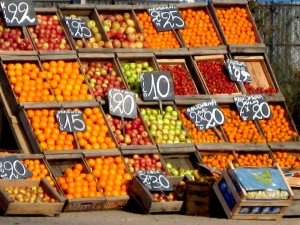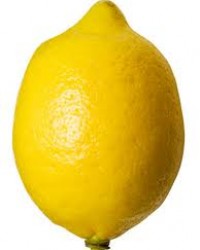8 Ways to Be a Cheapskate at Farmer’s Markets

I haven’t done a cost comparison to see if shopping for produce at a farmer’s market is any cheaper than at a grocery store, but as a regular shopper at both I’ve seen mostly higher prices at grocery stores. Not always, but often.
Even if you do find deals at the store, the quality isn’t often as good as it is from a farmer’s market where the produce was picked that morning or maybe a day or so earlier. I’m not trying to be a farmer’s market snob. Some things I’ve found at farmer’s markets during my weekly trips to them in the past seven years have not always been so great. But overall, I’ve found most of the produce to be top-notch.
Being a cheapskate at a farmer’s market requires some changing of your standards. And don’t think that these methods will put your local farmer out of business. They want to unload their fruits and vegetables every week, and will sometimes take a small loss if it means moving more items.
Here are some ways to be a cheapskate at a farmer’s market, and they don’t include having it delivered to your home:
Skip organic
Without getting into an argument over the overuse of the term organic and which foods should be grown organically for health reasons, if you want to save money as a cheapskate, skip buying organic at your farmer’s market. You’ll save at least 25 percent
If you absolutely don’t want fertilizers on the food you buy and are willing to pay extra for organic, then buy it. But know that it’s basically a technical term that requires adhering to certain practices and standards.
I’m not an expert in organic regulations for produce, but I can tell you from my conversations with farmers at my local farmer’s market that it’s a label that county regulators monitor closely for compliance. Some farmers basically grow their food organically but don’t go through all of the paperwork to get it certified.
There’s an organic stand at my local market that I always skip because I’m a cheapskate. I’m in drought-stricken California, where produce prices are high already, but I’ve seen the organic stand sell cherries for 50 cents more per pound than other stands.
Buy in season

I only buy apples in the fall and watermelon in the summer. Plums and apricots are plentiful during the summer, and are $2 per pound now versus $3 or more a month or so ago.
Be a late cheapskate
The farmer’s market I go to is open from 10 a.m. to 2 p.m. Arriving late can save you 50 percent or more.
I rarely do this, mainly because the fruit is so picked over by close to 2 p.m. that what’s left is often bruised and must be eaten within a day or so before it goes bad.
That may be OK if you plan on eating a lot of apricots fast, or will can them or turn them into jam. But if you want good fruit to eat for the next week, go early in the morning and pay the regular price.
Haggle as a cheapskate
Haggling is a lost art, I think, and one I’m not good at. But if you see an advertised price and can haggle well to a lower price, then this is the place to do it — especially at the end of the day at a farmer’s market.
Farmers want to pack up and leave, and haggling near closing time could save you 50 percent or more and make you the ultimate cheapskate.
But in my view, unless they’re offering a discount, why haggle a few dollars for some farmer who has done more work bringing your vegetables or fruits to market than you’ve done all week? It’s like stealing from a your child’s teacher.
Take a cheapskate walk first
This is advice I don’t always follow because I’m usually in a hurry. Too many times I’ve bought something — strawberries, for instance — at one stand and then come to another stand a few feet later that has better prices. That doesn’t mean the quality is the same, but a quick look and a taste can give you an idea of why one is cheaper than the other.
If you really want to be a smart cheapskate, take a walk around the farmer’s market and keep your money in your pocket while you compare prices. Then go buy the best deals.
Buy in bulk
I rarely to this because its too much fruit or veg for my family to eat before before it goes bad, but if you have a large family or are OK with eating a lot of one item for a week, then buying in bulk can lead to big savings as a cheapskate.
I’ve seen strawberries for $8 for a crate of six small baskets, while a package of three small baskets costs $5. Double the strawberries for only $3 more? Yes! Strawberry pies require a lot of strawberries.
Fresh corn during the summer, however, proved to be too much when 10 ears were only $6, compared to four for $3. You can only eat so much corn for dinner, lunch and snacks.
You can also use your haggling skills as a cheapskate to ask for a better price in bulk.
Go ugly
I’ve never done this, but I’ve heard that farmers will keep “ugly” produce aside that they don’t think will sell. Ask to see the “ugly box” and make sure you get a lower price if you buy anything in it.
Build goodwill and give them the change
I don’t like carrying around a pocket full of change. Digging for exact change at a busy farmer’s market can be a pain for everyone — you, the vendor and anyone waiting in line behind you.
I give my regular business to farmer’s market vendors who don’t charge in change. They either round up or down. If they round up, they always ask me if I want to throw in an extra plum or whatever I’m buying to make the total amount an even number. If apples weigh in at $3.74, I grab another apple and they charge me $4.
If they don’t go that route, then still give them $4 and tell them to keep the change. I’m not trying to be a big tipper, but want to make the point that I don’t want the change and would rather they have it.
One farmer I go to every week always rounds down. I often round it up for her because she’s so fair in her prices.
This goodwill as a cheapskate may not save you money immediately, but over time it may build you goodwill with the vendor and they’ll lower their prices for you.



These are all great tips! We plan on getting the rest of our produce this summer from the farmer’s market down the street so these tips will all be helpful.
I’ve been going with “uglies” for as long as I could remember. My grandmother taught me the trick back when we used to go to the markets together when I was younger. I agree that haggling is a lost art. And fortunately, I’m really good at it, so I try and do it whenever it seems appropriate.
We save our old bananas in the freezer, making banana bread often. If only I could haggle with someone and trade banana bread for peaches!
Congrats on being a successful haggler! That’s a great skill to have.
I turn to be a cheapskate whenever I am in a market. One practice I do is I haggle a lot until I get the discount I am satisfied with. If not, I look for other stores. It’s a matter of persistence, which is really helpful for me nowadays, now that I am a father.
One thing I always wonder about haggling and losing, and then going in search of another store, is when it becomes worth the cost when time is considered. I’m not for paying an unfairly high price, but sometimes the time spent shopping can be too much and not worth it. Just a thought. But congrats to you, Jayson, for making haggling work for you!
I believe in trying to get the best price that I can find. The farmers markets and flea markets in Central Florida are a great place to find awesome fruit and vegetables that are fresh from the farmers fields. I will do some haggling and price if I can find the same thing at another table at the flea market. But if the price is fair and cheaper than a grocery store I will pay the price that they are selling it for. I would rather pay a little more to the local farmer than give all me money to the big box store owners.
I agree, Tom. Part of my point is I don’t want to haggle with farmers who are barely eeking out a living anyway.